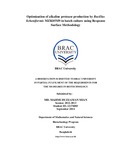Optimization of alkaline protease production by Bacillus licheniformis MZK05M9 in batch culture using response surface methodology
Abstract
Bacterial alkaline protease has got its particular eco friendly technical applications in leather
processing, detergent and feathers digestion to feed in Bangladesh. The present study is aimed at
the optimization of major factors affecting submerged culture fermentation for production of
alkaline protease by a Bacillus licheniformis MZK05M9 mutant strain using statistical Central
Composite Design (CCD) and Response Surface Methodology (RSM). The molasses as carbon
source, urea as nitrogen source and salt CaCl2.2H2O were selected to design a cost-effective
medium for production of protease by the B. licheniformis MZK05M9 mutant. The
concentrations of the medium components such as molasses, urea and salt CaCl2.2H2O were
optimized at pH 7.5, agitation 150 rpm and temperature 37°C. The optimum values for the tested
variables for the maximum alkaline protease production was found as molasses (0.63%, w/v),
urea (0.16%, w/v) and CaCl2.2H2O (0.11%, w/v) predicted by statistical software. The protease
activity in unoptimized medium was 410 U/ml where as 463.1 U/ml was predicted in optimized
medium by the software. But observed validated experimental value was 560U/ml in optimized
medium. Therefore, the statistical optimization by RSM resulted in 1.3 fold increase in the
production of the protease enzyme by the B.licheniformis MZK05M9 mutant. The productivity
in shake culture was 11666.6 U/L/hr while 13888.8 U/L/hr in bioreactor using optimized
medium. Partial purification of the protease was carried out by ammonium sulphate fractionation
and ultrafiltration membrane resulting the enzyme purified to 16.59 folds with specific activity of
38,736.7 micromoles/min/ mg of protein. The molecular mass of the enzyme was about 28 kDa
as judged by SDS-PAGE. The enzyme is very efficient in solubilisation of feathers and removal
of blood stain data revealing its potential for application in detergent industries. Based on the
productivity of the enzyme on locally available cheap ingredients, the present study will be a
useful basis for developing a bioprocess for commercial production of alkaline protease in
Bangladesh.

